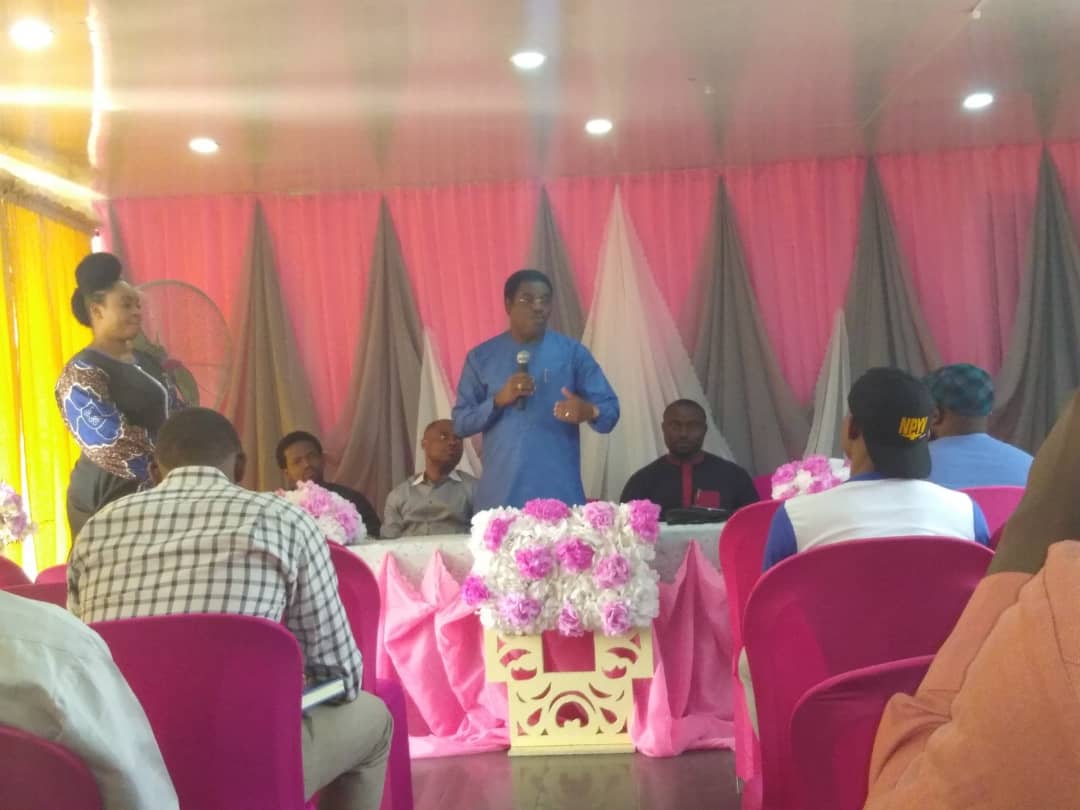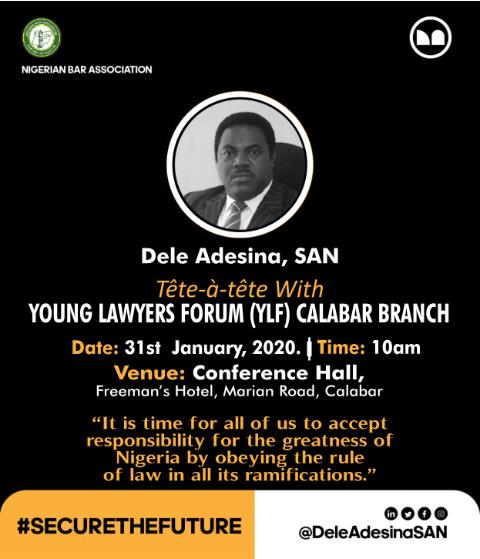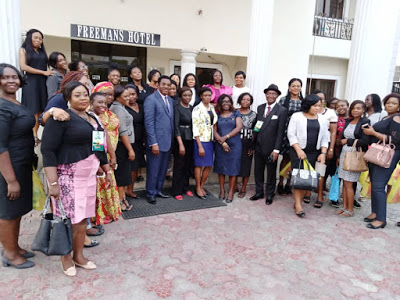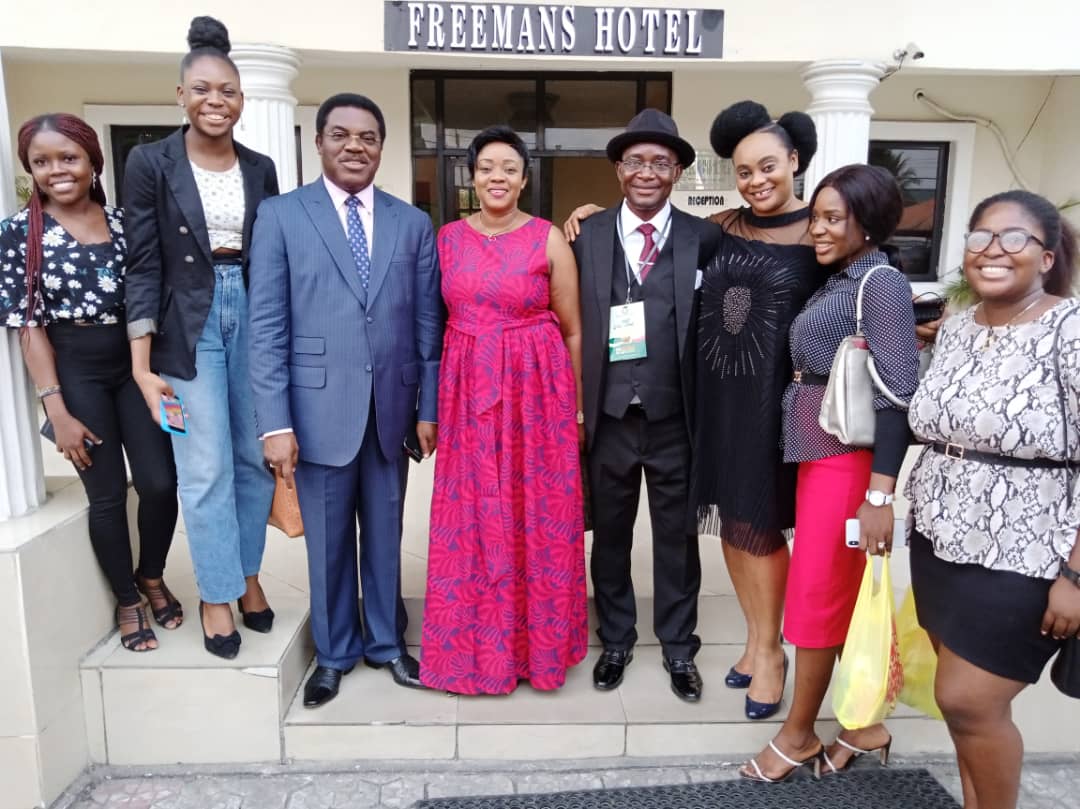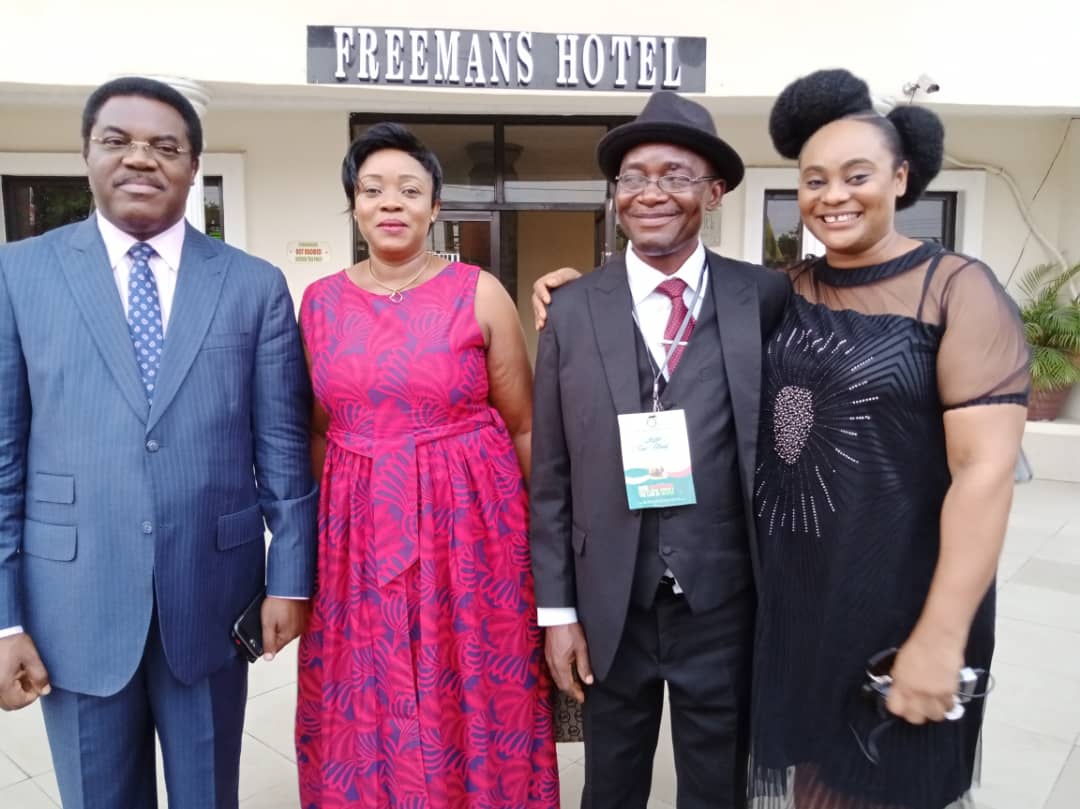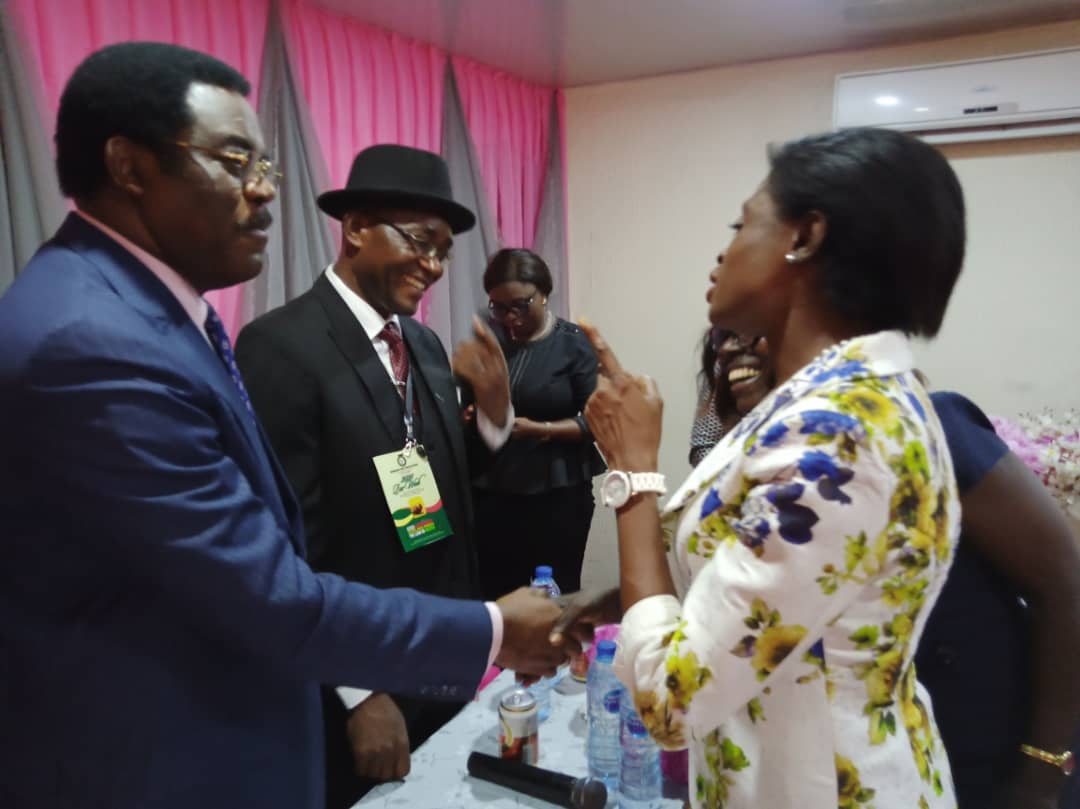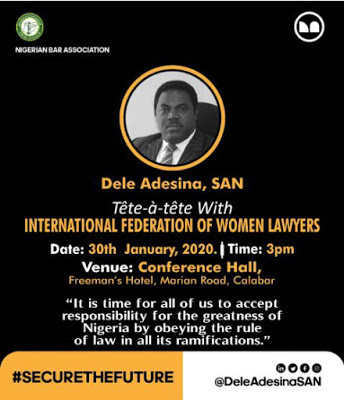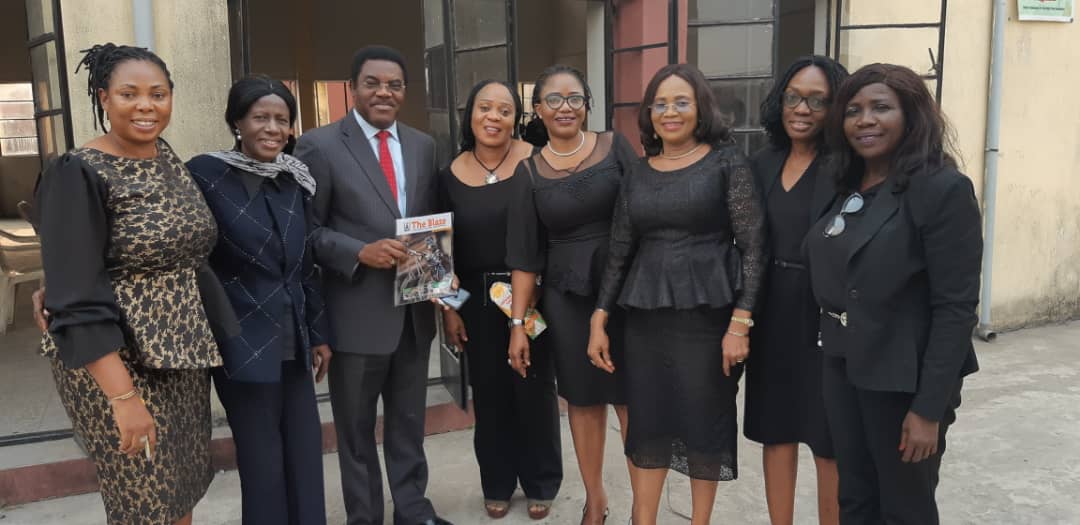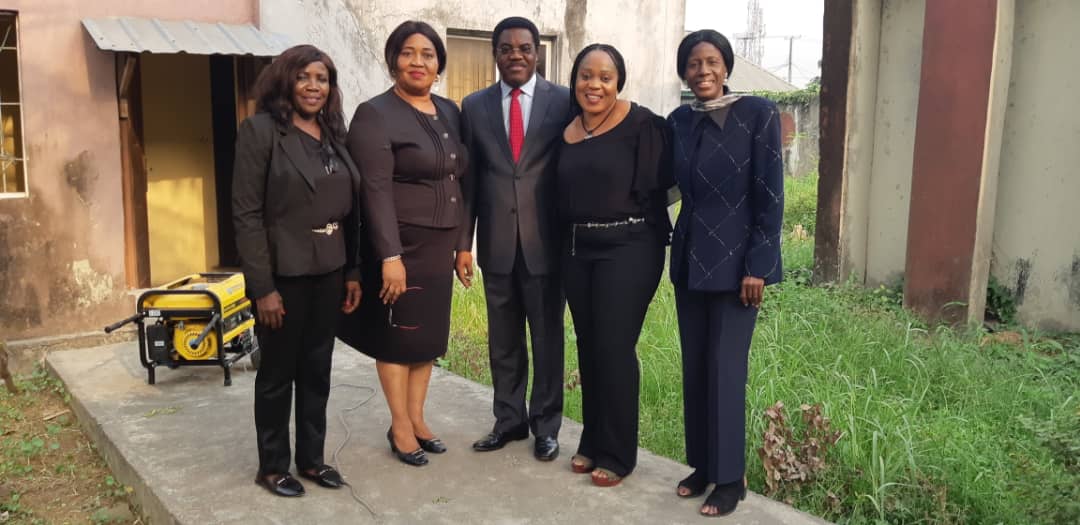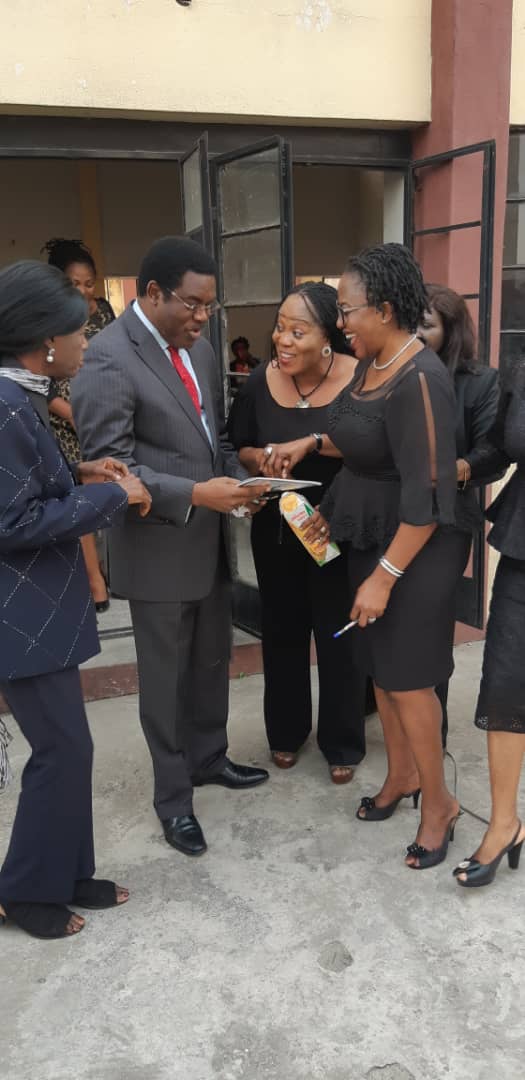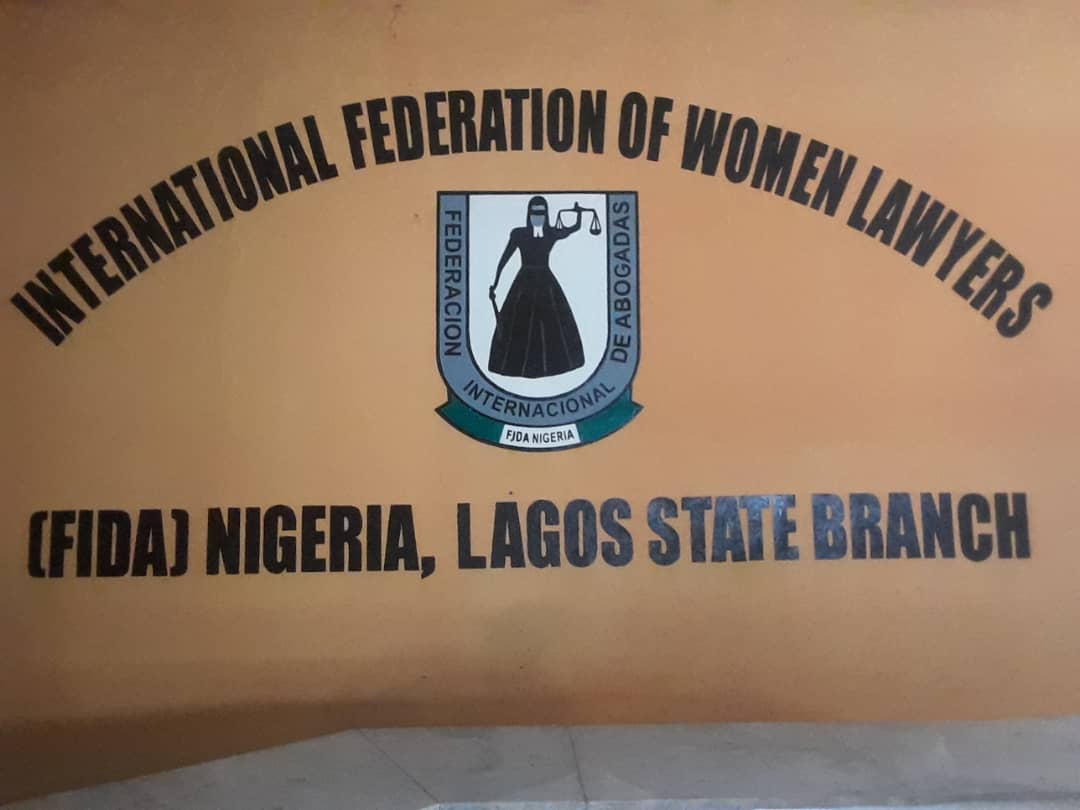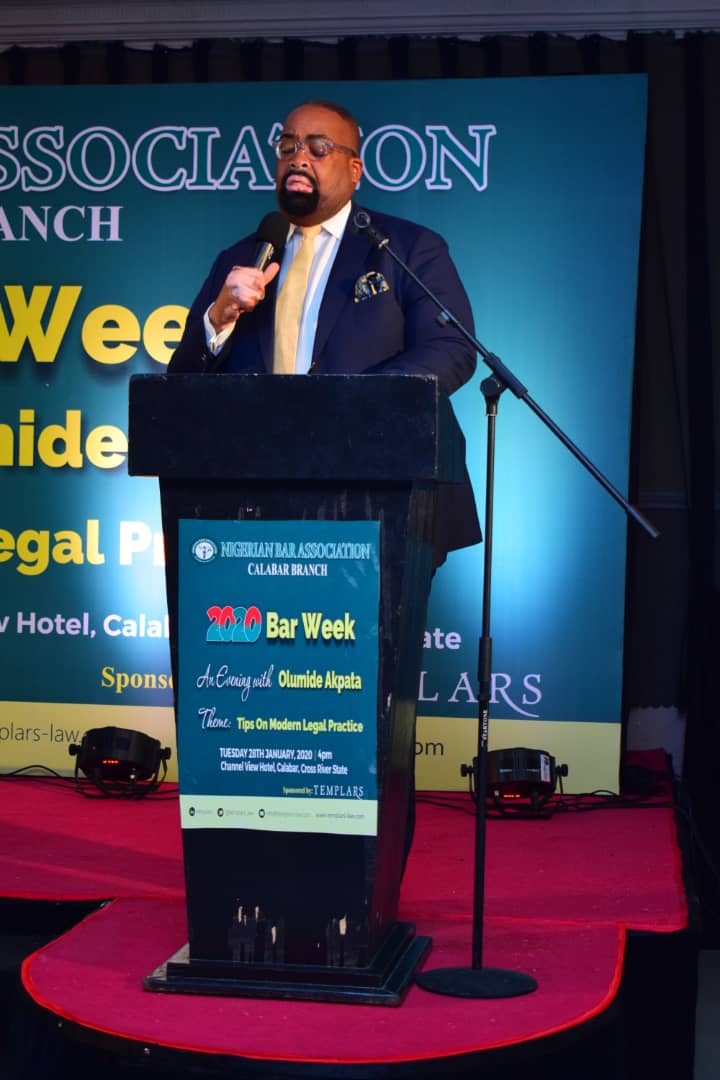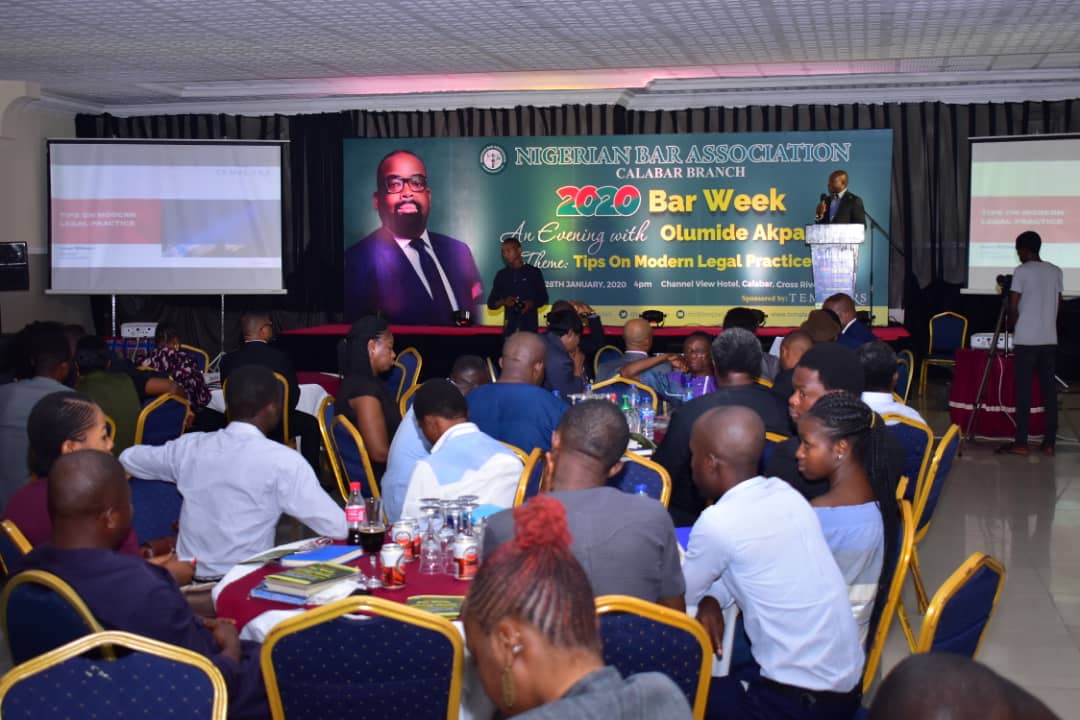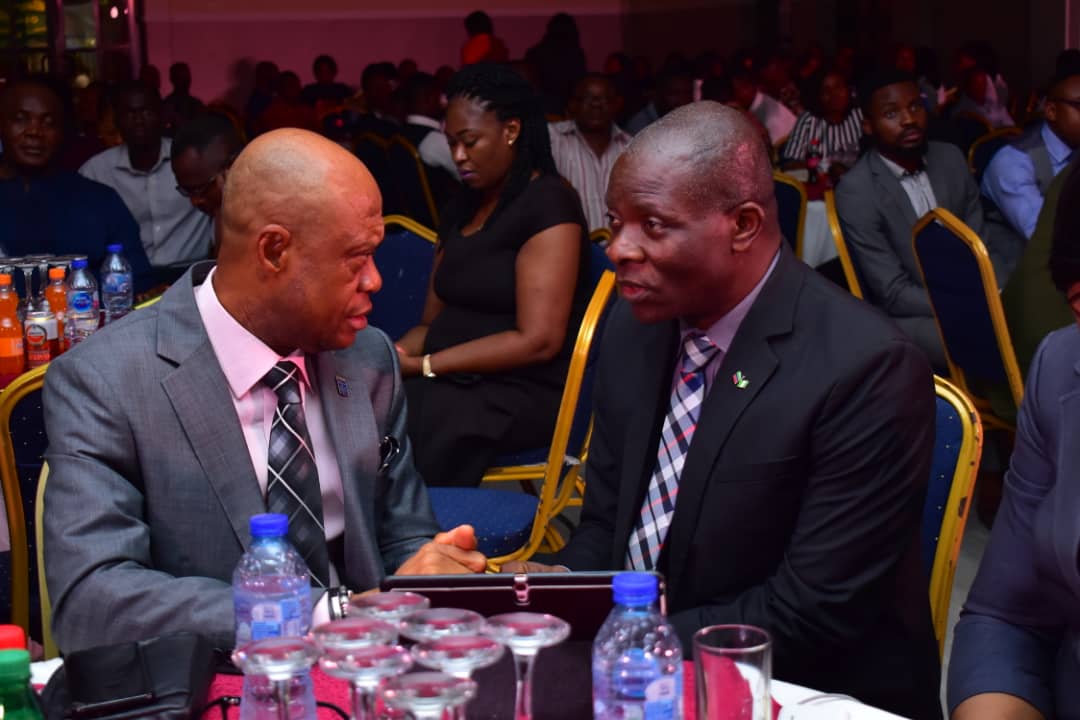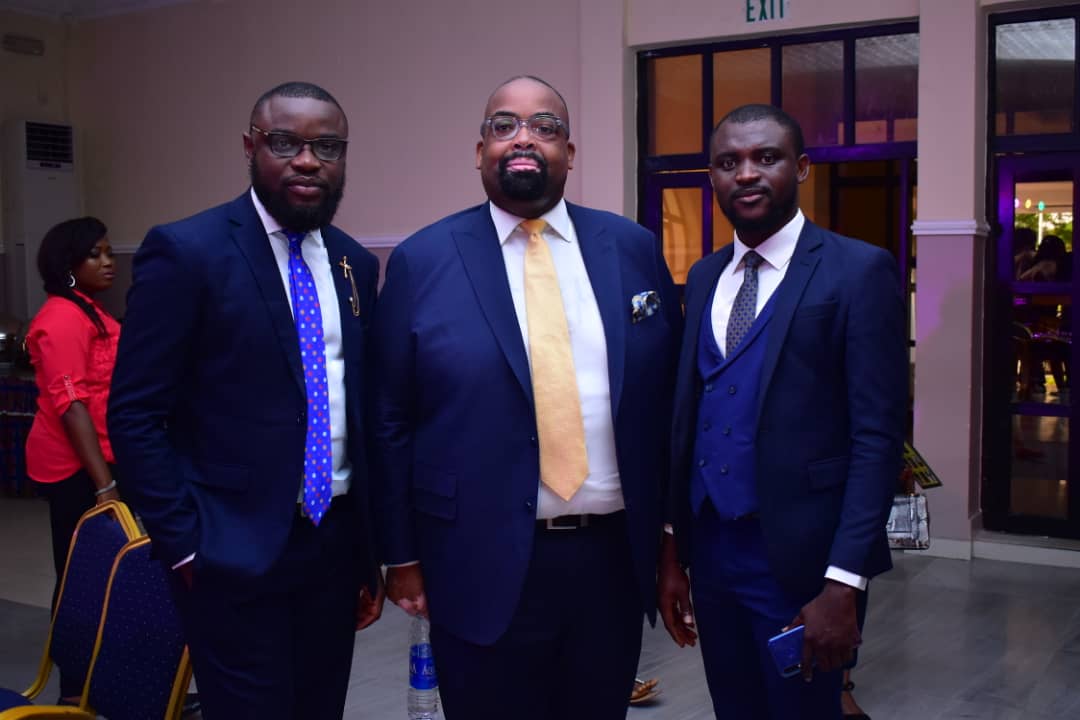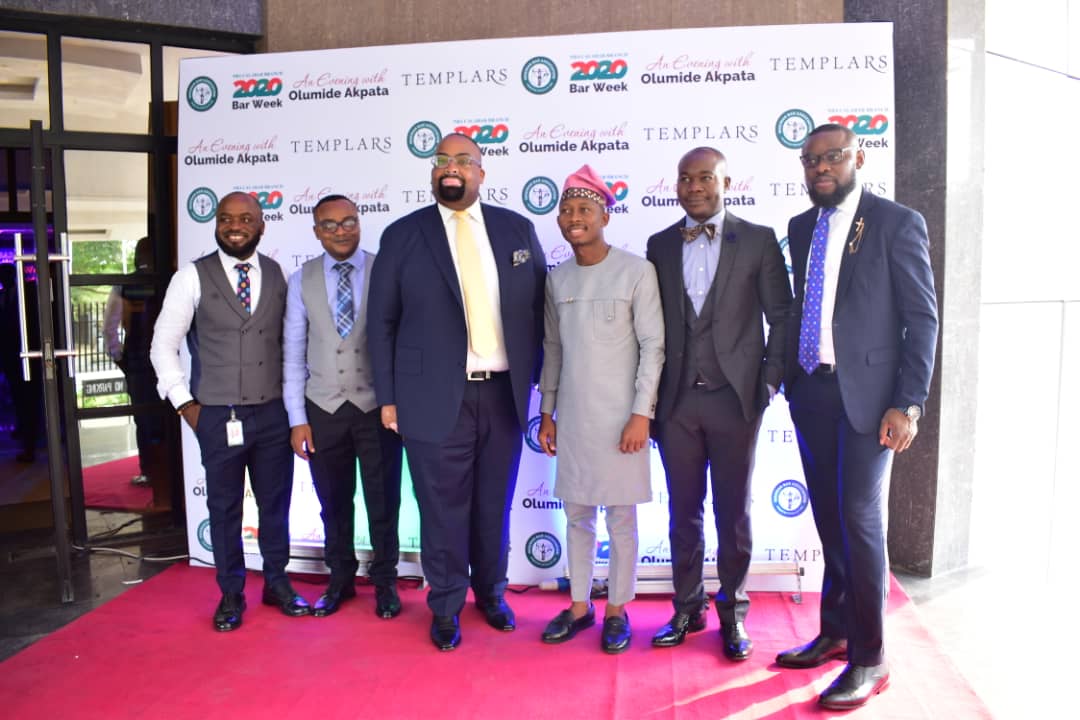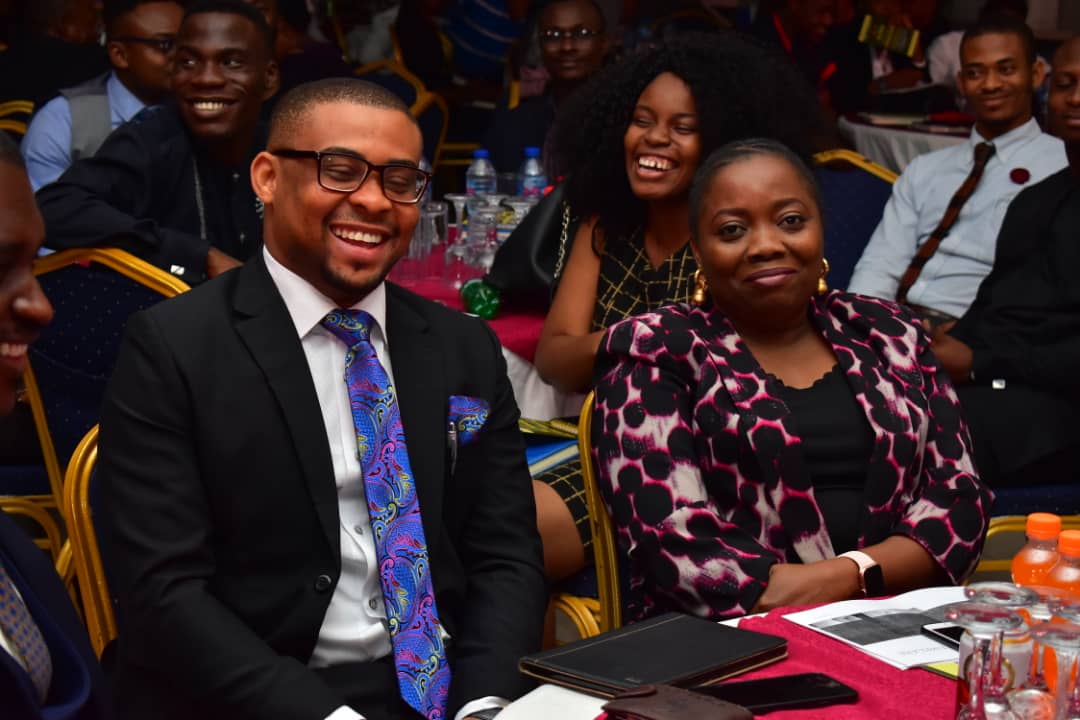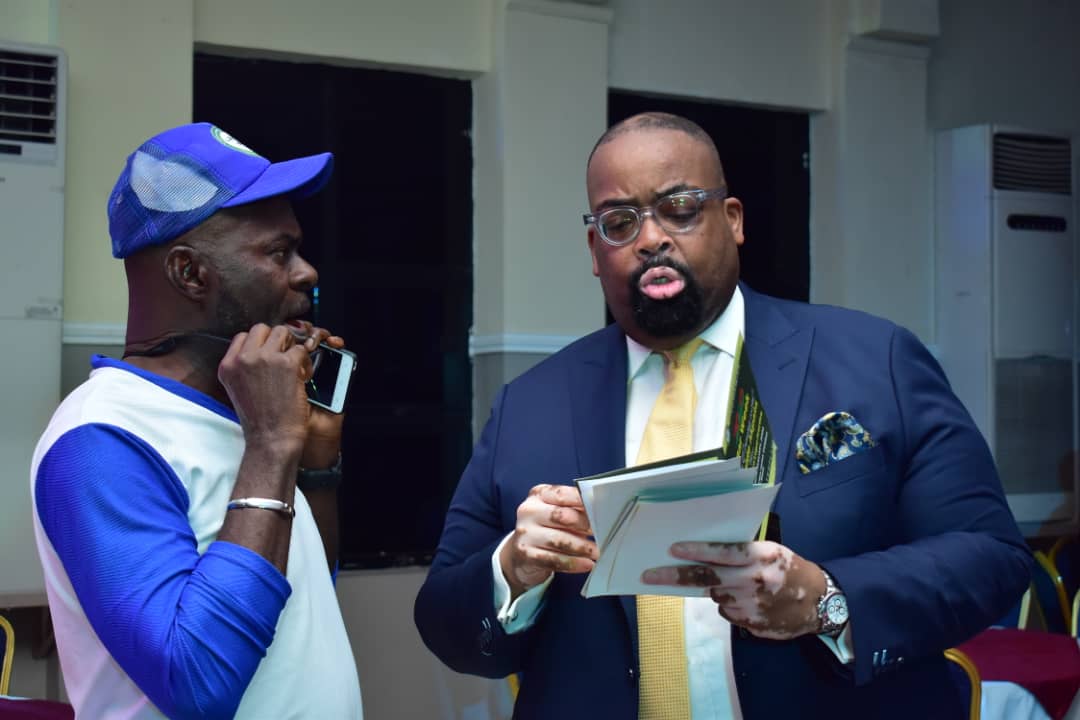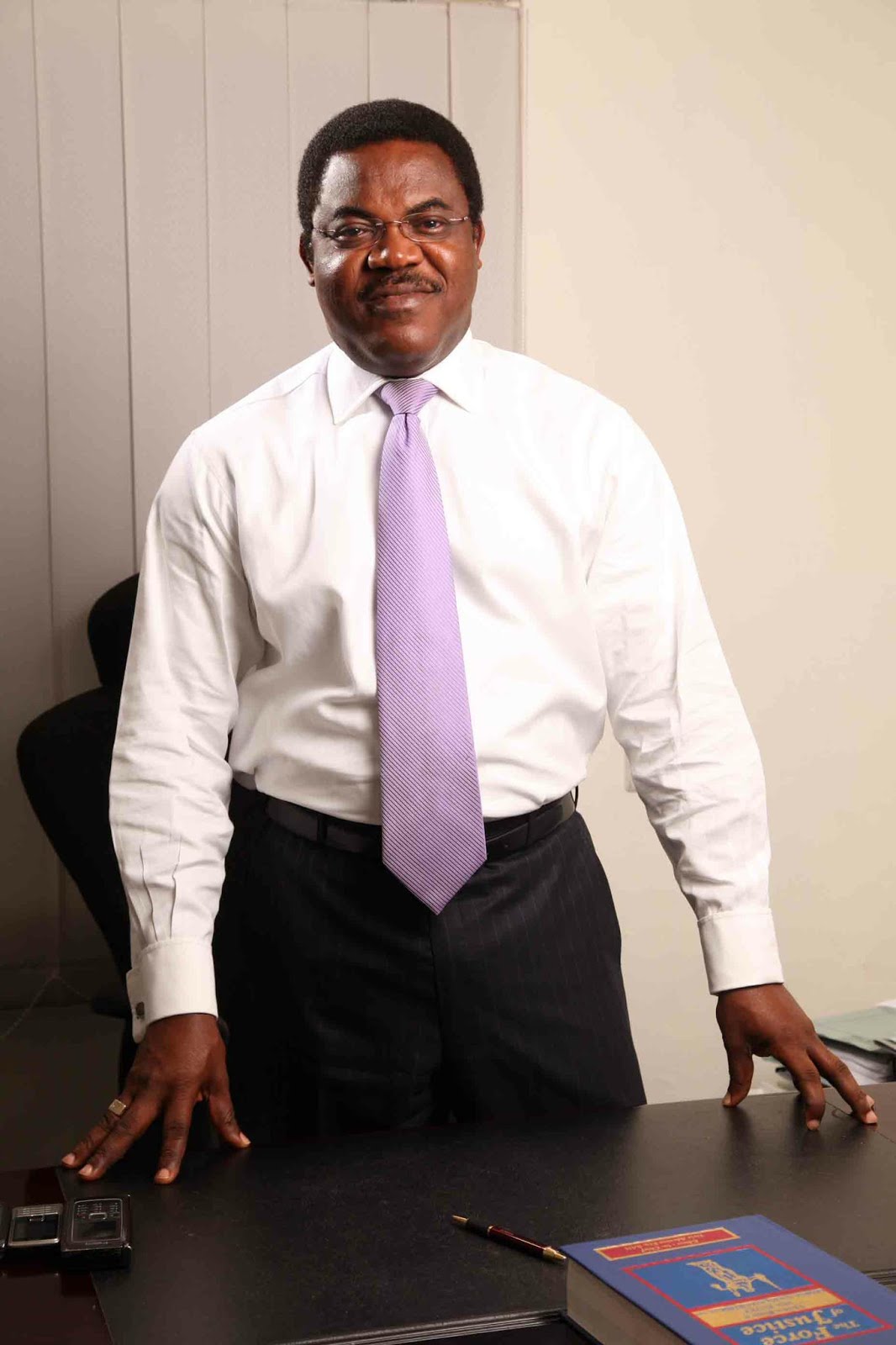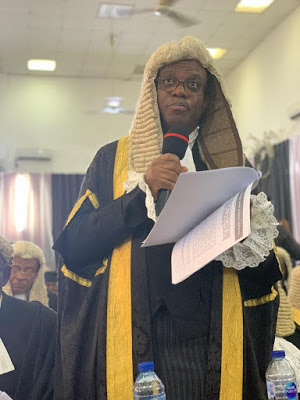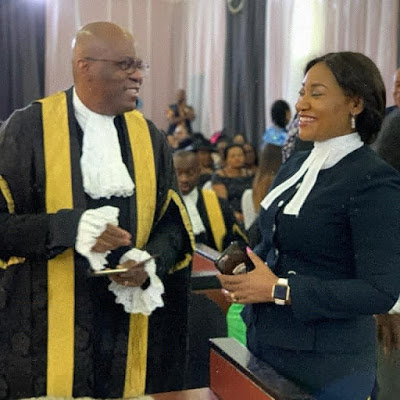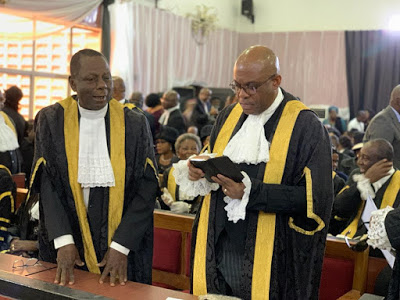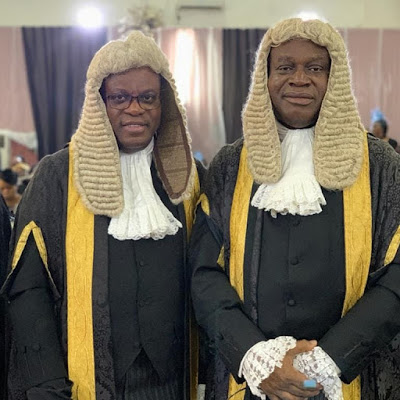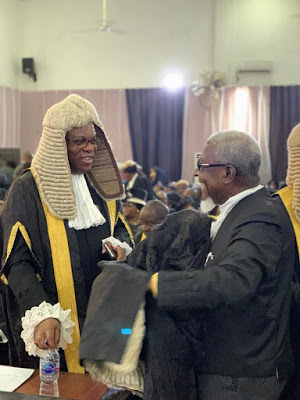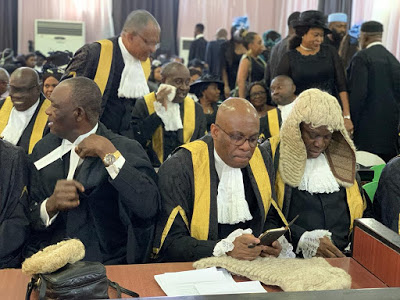Being a dinner speech by Dele Adesina LLM, SAN, FCIArb
at the NBA Akure Branch Law Week on Wednesday the 4th of December,
2019[i]
It
is a great honour and privilege to be invited to this Law Week Programme and
particularly to give the Dinner speech. My profound thanks to the Chairman,
Leaders and Members of this great Branch of our beloved Association.
I am
particularly excited that this Dinner is in honour of Honourable Justice Babatunde Adeniran Adejumo OFR, former President
of the National Industrial Court of Nigeria, a very astute, quintessential and
remarkable Judicial Administrator and a very great achiever indeed. I have
always believed that it is more appropriate and rewarding to celebrate heroes
in their lifetime, when they themselves can feel, and experience people’s love,
affection and admiration for them. So I thank the Branch for dedicating this
Dinner to the honour of Justice Adejumo.
Before
he became the President of the National Industrial Court, the National
Industrial Court was no more than an “obscured Court-house in a dilapidated
building” at Victoria Island, Lagos and another make shift building in Abuja.[ii]
Due to the vision, hard-work and commitment to excellence of Honourable Justice
Adejumo, the National Industrial Court was transformed from its obscurity to an
institution of National pride and global fame. You only need to see the
sprawling edifice of the Court in Lagos, Ibadan, Abuja and several other States
of the Country. It is also a product of his doggedness that the National
Industrial Court today has become one of the superior Courts created by the
Constitution by virtue of the Constitution of the Federal Republic of Nigeria,
Third Alteration Act, 2010.[iii]
From the beginning, it was not so.
The
theme of this year’s Law Week is “National
Interest and the Rule of Law in a Democracy: Any Conflict?” This theme is
not only topical but also very contemporary and of course very auspicious at
this point in time. It is topical because it is existential not only to us as
individuals but also to us as a Nation. It is contemporary in the sense that,
it is an issue of the moment as debates and arguments are ongoing as to whether
National Security, another amorphous word like National Interest, takes
precedent over the Rule of Law or not. It is also auspicious because a
discussion of the theme, which I believe you have had profusely since this Law
Week began and a humble addition I will make tonight, will promote a better
understanding in order to make our democracy successful and sustainable. The
Bible says that “the righteousness of
your testimony is everlasting, give me understanding and I shall live.”[iv]
Understanding promotes outstanding. The more we understand the concepts and the
system we operate as lawyers, the better we are in practising the system.
I
have taken the liberty, haven been told by the Branch Chairman to craft a topic
around the theme to speak on National
Interest and the Rule of Law in a Constitutional Democracy: Any Conflict?
Essentially, both the theme of the Law Week and my topic are one and the same
thing. However, the addition of the word “Constitutional”
is very paramount not just because we operate under a written Constitution
which is the ground norm of our Laws, but also because we practice democracy
based on the Constitution. In other words, we are practicing or we are supposed
to be practicing constitutional democracy. Secondly, the success or failure of
our democracy will be decided by our compliance or otherwise with the
provisions of this organic Law called the Constitution.
You
can hardly discuss democracy in Nigeria without taking your root from the
Constitution. Like I stated in my goodwill message, whether the promotion of
National Interest is in conflict with the promotion of the Rule of Law in a
constitutional democracy such as ours, or whether indeed one exists in
furtherance or advancement of the other in a symbiotic relationship, the answer
to these questions will be clear at the end of my short discuss tonight.
Let’s
attempt definition of the key words:
NATIONAL INTEREST
According
to Victor Lukpata, in the article National Interest and National Development
in Nigeria,[v]
the notion of National Interest is vague and so it is difficult to give a
precise definition. Generally speaking, National Interest can be defined as the
general long term and continuing purpose which the States, Nation and the
Government see themselves as serving. The National Interest of a State is
rooted in the social consciousness and in the cultural identity of a people. In
other words, the National Interest of a State is a product of social values
which the people have. Indeed, it has been said that, in practice, the National
Interest of a country is synthesized and checked by political leaders or
policy-makers, and that is why National Interest can also be defined as what
the policy-makers say it is.
In
the article titled National Interest:
Meaning, Components and Methods,[vi] Morjentahau defined National Interest
to mean survival, the protection of physical, political and cultural identity
against encroachment by other Nation States. You can see that National Interest
can mean whatever you say is National Interest if you become a policy-maker
tomorrow. Somebody in fact stated that the National Interest of a country can
mean the interest of its leaders. At a point in this Country, in the eyes of
the military leadership, National Interest meant National Security. To that
poor man on the street, the eradication of poverty can as well mean National
Interest. So also is finding a solution to insecurity of lives and property,
banditry, armed robbery and kidnapping on our highways in my own opinion also
constitutes National Interest.
RULE OF LAW
Recognising
my audience, I am not going to bother you with a long definition of the Rule of
Law. Suffice it to say that “Rule of Law
primarily means that everything must be done according to law. It means also
that government should be conducted within the framework of recognised rules
and principles which restrict discretionary powers, which Coke colourfully
spoke of as ‘Golden and Straight Matwand of Law’ as opposed to the uncertain and
crooked cord of discretion.” [vii]
In
the words of Honourable Justice Oputa
J.S.C., “Rule of Law presupposes:
(i) that the state is subject to the Law; (ii) that the Judiciary is a
necessary agency of the Rule of Law; (iii) that Government should respect the
right of individual citizens under the Rule of Law; (iv) that to the Judiciary
is assigned both by the Rule of Law and by our Constitution the determination
of all actions and proceedings relating to matters in disputes between persons,
governments or authority.” [viii]
As
far as 1995, the International Commission of Jurists in calling attention to
the apparent disregard of the Rule of Law in many Nations of the world, solemnly
made the following declaration (which has become my darling statement) in the
Act of Athens that:
i.
The
State is subject to the Law;
ii.
That
Government should respect the right of individuals under the Rule of Law and
provide effective means for their enforcement;
iii.
That
the Judges should be guided by the Rule of Law, protect and resist any
encroachment by the Government or Political Parties on their independence as
Judges;
iv.
That
Lawyers of the World should preserve the independence of their profession, assert
the rights of the individual under the Rule of Law and insist that every
accused is accorded fair trial.
DEMOCRACY
In
its simplest form, Abraham Lincoln said that “Democracy means the government of the people, by the people and for
the people.” I did not understand this eternal definition to mean the
government of some people, by some people, and for some people as our elections
are beginning to show in Nigeria today. A few days ago somebody in a write-up
said that “Nigeria’s democracy is fast becoming
the government of the politicians, by the politicians and for the politicians.”
This position, if it is not true at all, I submit is arguable. Not subject to
any argument, however the definition that says democracy is about people, and people are at the very centre of
democracy; therefore, for democracy to endure, it must necessarily guarantee
the improvement of the lives of the people. Democracy and development are two
sides of the same coin and the two concepts are mutually reinforcing.”[ix]
In
words of Judge Bola Ajibola SAN
(supra), “For democracy to endure, it
must guarantee the improvement of the lives of the people.” In my own
humble opinion, I also wish to submit that, for democracy to endure, it must
guarantee the supremacy of the choice of the people, made in a free and fair
electoral contest and competition, conducted in accordance with the enabling
law, without harassment or intimidation. It must increase the standard of
living of the people. It is again arguable if we are measuring up to these
fundamental ideals of democracy.
CONFLICT
The
other key word in the topic is the word ‘Conflict’.
The Oxford Advanced Learner’s Dictionary, Sixth Edition,[x]
defined ‘Conflict’ to mean: “a situation
in which people, groups or countries are involved in a serious disagreement or
argument. A situation to which there are opposing ideas, opinions, feeling, or
wishes. A situation to which it is difficult to choose.”
The
Black’s Law Dictionary[xi] defined
‘Conflict’ as per conflict of interest or conflict of law to mean: “a real or seeming incompatibility between
ones’ private interest and ones’ public or fiduciary duties. A difference
between the laws of different States or Countries in a case in which a
transaction or occurrence central to the case has a connection to two or more
jurisdictions.” For example, “a real
or seeming incompatibility between the interest of two of a lawyer’s clients
such that the lawyer is disqualified from representing both clients if the dual
representation adversely affects either client.”
In
the light of the understanding of these definitions, is the propagation or the
promotion of the Rule of Law which is the gravamen of any democracy in conflict
with National Interest in a constitutional democracy? I think NO.
It
is my submission that without the Rule of Law there can be no democracy because
democracy itself is founded on the Rule of Law. To the extent that the word
‘National Interest’, as understood, is not capable of one definitive meaning, I
submit that it must be made subject to the Rule of Law. In other words, if
everything must be done in accordance to the Rule of Law, whatever is held to
be of National Interest must of necessity pass the test of the Rule of Law. No
room for impunity, little or no discretion, no dictatorship, arbitrariness,
authoritarianism, abuse or misuse of power. It is also significant to mention
that there must be a strict adherence to the provisions of the Constitution.
As a
Legal Practitioner, I will go as far as to submit that compliance with the
provisions of the Constitution is not only in the National Interest of our
Nation, it is also a veritable guarantee for National Security. In the words of
the Supreme Court, in the case of Attorney-General
of Ondo State v. Attorney-General of the Federation: [xii]
“Our Constitution is an organic instrument which confers
powers and also creates rights and limitations. It is the supreme law in which
certain first principles of fundamental nature are established. Once the
powers, rights and limitations under the Constitution are identified as having
been created, their existence cannot be disputed in a Court of Law. All
agencies of government are organs of initiative whose powers are derived either
directly from the Constitution or from laws enacted thereunder.”[xiii]
Also,
in Attorney-General of the Federation v.
Attorney-General of Abia State & 35 Ors,[xiv]
the Supreme Court stated abundantly that:
“The fountain of all laws is the Constitution. It is the
composite document setting out how the Country is to be held together. It is
not a document to be read with levity or disdain. Every section must be given
its meaning… it is the very foundation of the Nations existence.” [xv]
My
submission therefore is that uncompromising obedience to the provisions of
Constitution and due process is of National Interest. So also, obedience to
Court Orders and Judgments which are principal and fundamental principles of
Rule of Law in a constitutional democracy, is not only in the National Interest
of our Nation but it is also a guarantee of National Security and Stability.
In
my humble opinion, a threat to Rule of Law is a threat to National Interest.
Every citizen of the Country is entitled to the enjoyment of his fundamental
Human Rights and freedom as enshrined in Chapter Four of the Constitution of
the Federal Republic of Nigeria, 1999, as amended. These rights include but are
not limited to right to life,[xvi] right to dignity of human person,[xvii]
right to personal liberty[xviii]
including a right to be released from custody or granted bail if he is not
tried within two months from the date of his arrest or detention and a right to
be released either conditionally or unconditionally if he is not tried within
three (3) months from the date of his arrest or detention in the case of a
person who has been released on bail.
We
also have rights such as right to fair
hearing[xix]
and more fundamentally the Constitutional imperative that every person who is
charged with a criminal offence shall be presumed to be innocent until he is
proved guilty in pursuant to Section 36 (5) of the Constitution of the Federal
Republic of Nigeria, 1999, as amended. These rights and many others contained
in Chapter Four of the Constitution, I submit, exist for both the conformists
and the non-conformists in the society.
Quare! How far have we been able
to comply with these constitutional provisions by our conducts and actions? For
example, a lot has been said by members of the public, both lawyers and
non-lawyers alike, about the continued detention of Omoyele Sowore and his
co-defendant, Bakare, who were arrested sometime in August 3rd 2019
and charged with treason, money laundering, cyber-stalking and harassing the
President. They were granted bail on September 24, 2019. As at the time of
writing this paper, on the 3rd of December 2019, they are yet to be
released in accordance with the subsisting Order of a Court of competent
jurisdiction. Another example is that of Dazuki who was similarly arrested on
December 1, 2015 for allegedly stealing Two Billion, One Hundred Million
Dollars (USD 2,100,000,000.00). His first bail was granted on August 30, 2015 by
the F.C.T. High Court, Abuja.
Several
other Judges have similarly granted bail or confirmed the earlier bails
granted. Most strikingly, on the 2nd of July 2018, a Judge of the
Federal High Court described Dazuki’s continued detention as an aberration of
the Rule of Law. On July 13, 2019, the Court of Appeal affirmed the bail
granted by the lower Court and even awarded damages against the Federal
Government for holding Dazuki against the provisions of the Constitution. As we
speak, Dazuki is still in detention. Mention must also be made of Ibrahim El-Zakzaky
and another who were arrested in December 2015. Up till now their trial has
been going forward and backward. Yet, Section 36 of the Constitution of the
Federal Republic of Nigeria, 1999, as amended guarantees speedy and expeditious
trial.
I
believe some of you will recall a number of massive protests by the Shiite
group, the followers of the detained leader. Such protests some of which have
rarely recorded violence are certainly not in favour of our National Interest.
These are major cases which have attracted both local and international
condemnations. There are several cases of this nature of lesser mortals in our
society. I have gone this far to demonstrate the symbiotic relationship between
these terms.
As
lawyers, we do know that the Constitution of Nigeria is very clear,
unambiguous, uncompromising and categorical about the rights of its citizens
both those who are on the right side of the law and those who are reasonably
suspected of being on the wrong side of the law, when it comes to matters of
the curbing or curtailing its citizen’s rights, it does not leave us in any
doubt as to what should be done or as to how we should proceed nor does it
leave matters to chance or to the discretion of individuals who may be inclined
to subject such inalienable or immutable rights to abuse. These are the
immutable words of the Court of Appeal in the case of Akila v. Director-General State Security Services and Others.[xx] See also Adesanya v. President, Federal Republic of Nigeria.[xxi]
As a
Legal Practitioner, trained under the Common Law tradition, it is my considered
view that disobedience to Court Orders and Judgments constitutes a veritable
threat to National Interest and National Security. It is also a blatant
violation of the Rule of Law. May I also add that it is a threat to sustainable
democracy.
CONCLUSION
Let
me remind myself that this is a dinner speech which is not supposed to be full
scale lecture, otherwise the food gets cold and appetite gets worse. Let me
therefore conclude that survival of democracy in Nigeria is a matter of
National Interest, not only to our policy-makers or people in government but
also to everyone including and in particular all lawyers in this Country. The
bedrock of any democracy is the Rule of Law. So sustainability of democracy and
Rule of Law in Nigeria are matters of paramount National Interest. I do not see
any of them conflicting with the other. Indeed, one advances the course of the
other.
May
I conclude by quoting the erudite and affirmative pronouncements of Honourable Justice Niki Tobi in the
case of Onagowura v. Inspector-General
of Police [xxii] that:
“Nigeria is a democracy and by the grace of Almighty God,
it will remain a democracy for all times. The foundation of any democracy is
anchored on the Rule of Law, both in its conservative and contemporary meaning.
Putting it naively, we are paid mainly and essentially to uphold the Rule of
Law in the entire polity. And so, once we fail to uphold the Rule of Law,
anarchy, despotism and totalitarianism will pervade the entire society. The
social equilibrium will be broken. Law and Order will breakdown. Everybody will
be his own keeper and God for us all (as in the animal kingdom). We as Judges cannot
afford to see society decay to such an irreparable level. We must rise up fully
to our duties by vindicating the tenets of the Rule of Law in our practised
democracy.”
May
God bless all the Justice Niki Tobis’ that are still in our judicial system today.
Permit
me to leave you, both our Judges and lawyers that are here, with this challenge,
that our Judges should be guided by the Rule of Law, protect and resist any encroachment on your
independence as Judges. For us as lawyers, we must preserve the independence of
our profession, assert the rights of the individual under the Rule of Law and insist that every accused is accorded
fair trial.
It
was James Maddison, the President of
the United States of America, from 1809 – 1817, that said: “When tyranny and oppression come to the land, it will be in the guise
of fighting crime.”
We
cannot afford to shy-away from our responsibilities; neither can we sit on the
fence in the affairs of our Country. Frank
Fallon said that: “If you are an
onlooker, you are either a coward or a traitor; at best you are a spectator.”
Ours
is a developing democracy in a developing society, we are far away from the
United Kingdom and the United States of America in terms of development, both
as a society and as a democracy. As Lawyers in a developing society, therefore,
we must be guided by the immortal words of Kenneth
Kauda, former President of Zambia, made in January 4th 1962,
that:
“The lawyer in a developing society must be something
more than a practising professional man; he must be more even than the champion
of the fundamental Rights and Freedom of the individual. He must be in the
fullest sense a part of the society in which he lives and he must understand
that society, if he is to be able to participate in its development and the
advancement of the economy and social well-being of its members.”
I
thank you very much for listening, God bless you.
Dated 4th
of December, 2019
Dele Adesina SAN FCI. Arb
Principal Counsel
Dele Adesina LP
109 Opebi Road, Ikeja Lagos
E-mail: deleadesinasan@yahoo.com
Telephone: +234 803 302 9055
END NOTES
[i] Dele
Adesina is a Senior Advocate of Nigeria; Past General-Secretary, Nigerian Bar
Association; Life Member, Distinguished Body of Benchers; Immediate Past
Pro-Chancellor and Chairman Governing Council, Ekiti State University; and,
Principal Counsel in the Chambers of Dele Adesina LP.
[ii] National
Industrial Court of Nigeria Brochure for Retirement Ceremony of Honorable
Justice B.A. Adejumo, OFR on September 30, 2019.
[iii] An
Act to alter the Constitution for the Establishment of the National Industrial
Court under the Constitution at No. 3 of 2010.
[iv] Psalms
119 verse 144.
[vii] Governor of Lagos State v. Ojukwu [1986] 1 NWLR (Pt.
18) 621 at pg. 636.
[viii] Governor of Lagos State v. Ojukwu [Supra]
[ix] Keynote Speech of His Excellence, Judge Bola Ajibola
LL.D, SAN, Past President of the Nigerian Bar Association (NBA) at the NBA
Lagos Branch 2003 Law Week.
[x] The Oxford Advanced Learner’s Dictionary,
Sixth Edition, at page 239.
[xi] Black’s
Law Dictionary, 9th Edition, at page 341.
[xii] [2002] 9 NWLR (Pt. 772) 221.
[xiii] [2002]
9 NWLR (Pt. 772) 221 at pp. 418 – 419.
[xiv] [2001]
11 NWLR (Pt. 725) 689.
[xv] [2001]
11 NWLR (Pt. 725) 689 at pg. 736.
[xvi] Section
33 of the CFRN, 1999, as amended.
[xvii] Section
34 of the CFRN, 1999, as amended.
[xviii] Section
35 of the CFRN, 1999, as amended.
[xix] Section
36 of the CFRN, 1999, as amended.
[xx] [2014]
2 NWLR (Pt. 1392) 443 at p. 463.
[xxii] [1991] 5 NWLR (Pt.173) 593 at p. 650.
